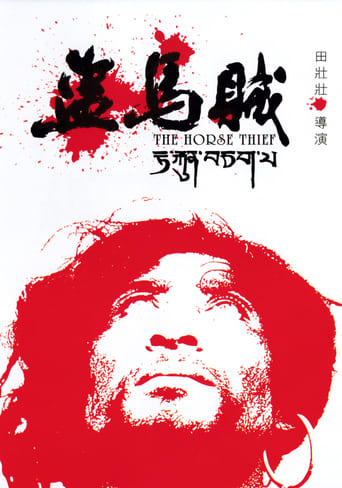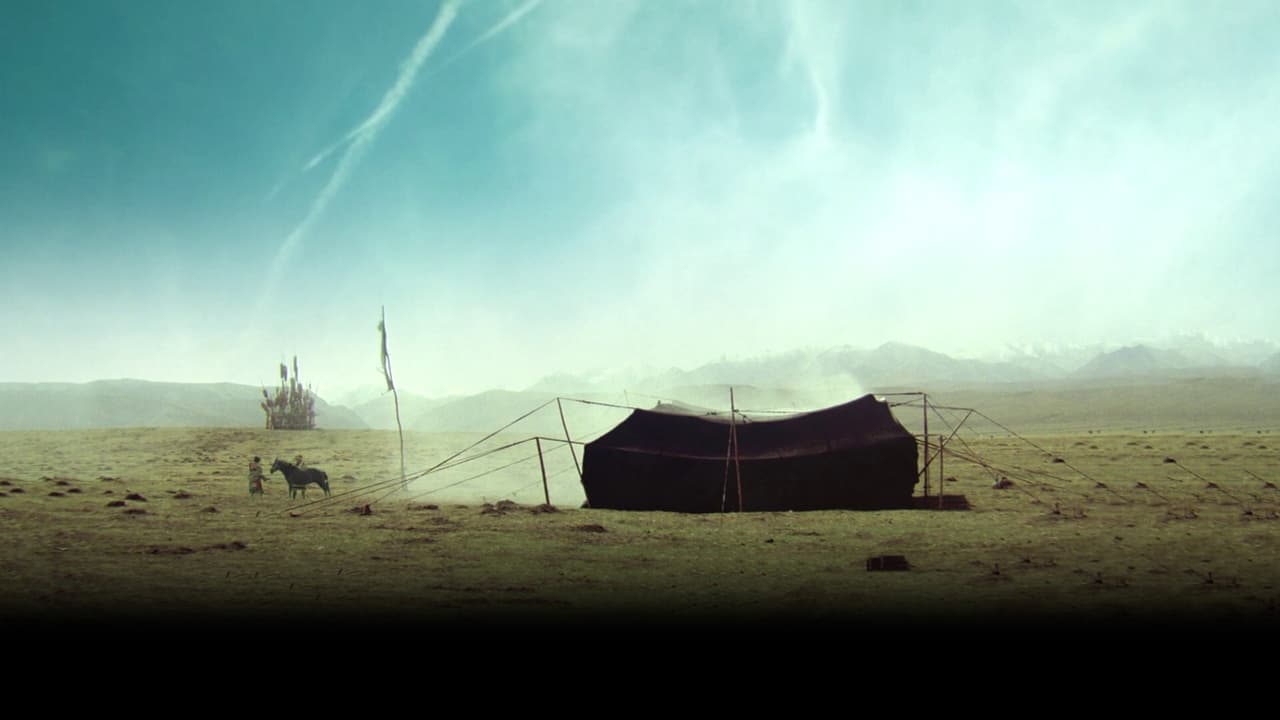Jackson Booth-Millard
This Chinese film is one that I found featured in the book 1001 Movies You Must See Before You Die, obviously I never knew anything about it before reading the book, but it was rated well by critics, I hoped it would be another worthy title from it. Basically in Tibet, Norbu (Rigzin Tseshang) is a devout Buddhist, the only way he can support his wife Dolma (Jiji Dan) and their child Tashi (Jamco Jayang) is to be a highwayman, stealing horses. He is charged with stealing from the temple, inexplicable as he gives a lot of his money to them, he and his family are banished. Reduced to poverty and marginalized, Norbu and his family are forced to struggle against the harsh terrain and the elements of the desert landscape. There is nothing they can do for their beloved son when he becomes deathly ill, Tashi dies of a fever, and Norbu is repenting. But he is given a purpose when Dolma gives birth to a second son, he focuses all his attention to keeping them alive, he attempts to seek re-admission to the clan for his wife and child. Also starring Daiba as Granny, Drashi as Grandfather and Gaoba as Nowre. Director Tian Zhuangzhuang has good cinematic technique, the film has hardly any foreign dialogue, only small exchanges, most of the film is made up of images of the Tibetan plains, the horse stealing, indigenous animals, and colourful tribal traditions and activities, it is a surprisingly interesting drama. Good!
maxastree
I found out about this film via Mark Cousin's well regarded "The Story of Film: an Odyssey", when he outlined some of the strongest features of the 80s.The Horse Thief is a strikingly shot immersion into the unique, isolated and overwhelmingly spiritual culture of traditional Tibet, a country of snow laden plains and remote agrarian village life.The nominal plot focuses on Norbu, a thief who is excommunicated from his tribe, to live in the harsh Tibetan hinterlands with this wife and child. Even his elders disdain him, and appear to show no sympathy for his crimes.The tribe worships a local mountain deity for providence, but during an outbreak of disease many animals and family members suffer, some terminally. Norbu's family is allowed back into tribal society although his penalty is death, and there appears to be no alternative in the mid winter Tibetan snowfields.The film's plot is almost overshadowed by the cinematography and focus on Tibetan civilization; their religious rites, celebrations, trading and working life all feature throughout. Parts of the "story" are presented as a dreamy montage of dancers, elemental images and Tibetan masks, with Buddhist themes of death and rebirth enacted by the cast, which is one of the exceptionally interesting things about the movie.Its not really an epic film, and the actual scripted dialogue is pretty sparse, but worth seeing especially if you have a projector or similar large-screen display.
I B
A film about individual choices and morality, The Horse Thief centres on a Tibetan man named Norbu (Rigzin Tseshang) who supports his wife and young son by stealing horses and robbing Muslim travelers at knifepoint. Director Tian Zhuangzhuang tells this timeless story in fragmentary episodes punctuated by fades to black. At the time it was made, the film's sincere curiosity about Tibetan culture and rituals could be seen as questioning China's claim to Tibet, just as its dreamlike qualities amounted to a riposte to the preceding 37 years of didactic, Maoist propaganda film-making. The authorities insisted on adding an opening caption setting the film in 1923, decades before the People's Liberation Army marched into Tibet. But the film's underlying thrust is censor-proof. By showing a man at once enslaved by his religion and flouting every tenent of its morality, it raises fundamental questions about belief systems - questions as relevant to political ideologies as to religious faiths. Seen by more people abroad than inside China (where it was effectively shelved), Tian's remarkable film is nonetheless one of the defining works of modern Chinese cinema. The film (his third as sole director) owes its existence to a short-lived policy of producing innovative films at the Xi'an Film Studio in western China, and it reflects the moment - ten years after the death of Mao - when Chinese society was beginning its convulsive transition from Stalinist communism to free-market capitalism with 'Chinese characteristics'.
LeSamourai
After hearing Martin Scorsese declare Horse Thief as the #1 film of the 90s (actually released in 1987) when co-hosting the annual "Best of" show with Roger Ebert, I set out to see this film. Luckily, there was a copy available in the library. Unfortunately, the library would not allow me to take it home. So, I was stuck watching this film on a 10 inch screen television in a cramped cubicle with uncomfortable headphones crushing my ears. Obviously, this was not the way that Tian intended his film to be viewed.Tian Zhuangzhuang's third feature, Horse Thief, is essentially dialogue-free and is rather slim on plot. The film is reminiscent of the silent-era when directors were capable of manipulating the camera to communicate their desired idea. Basically, the film centers on the banishment of Norbu (forcefully personified by Rigzin Tseshang in an astonishing debut), a local horse thief, and his wife and son. Norbu gives up stealing horses for his wife and sets out to find a more respectable profession. When times get rough, Norbu is confronted with the reality that he must steal again to save his family from the harsh, unforgiving winter.Tian's film has a striking realistic quality to it that plays like a documentary. In one scene, we are given the chance to watch a ritualistic ceremony designed to please the mountain god. While this scene evokes awe, some scenes may be seen as quite offensive. For example, Norbu comes up behind an unsuspecting lamb and slits its throat. The viewer is forced to watch the animal writhe and thrash agonizingly struggling for its last breaths. This scene, although I cannot deny its accuracy and technical beauty, is distressing to watch. The reality of this scene is not achieved through use of mechanical animals and fake blood; it is achieved by the actual killing of a lamb for the production of this film. Aside from this painfully unpleasant section, Tian's cinematic mastery is thoroughly evident.Because of the deficient viewing conditions, I was only able to catch a glimpse of Tian's overwhelmingly glorious cinematography: Norbu dolefully places his son's dead body in the middle of a snow-covered meadow for the gods to take. In deep focus, the camera slowly reveals Norbu's utter aloneness and emptiness. In this one shot, Tian has created cinematic perfection.


 AD
AD
